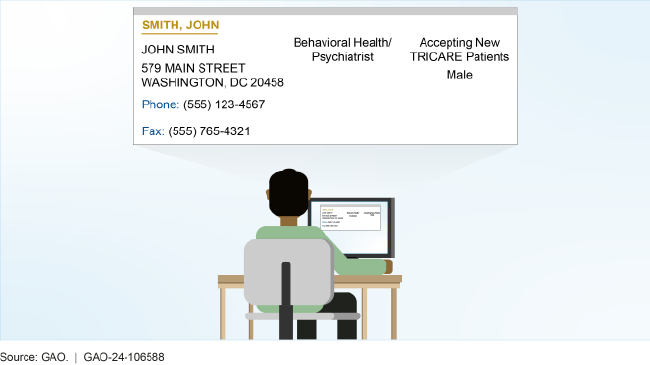Defense Health Care: DOD Should Improve Accuracy of Behavioral Health Provider Information in TRICARE Directories
Fast Facts
DOD's TRICARE program provides health care to active and retired service members and their families. This includes behavioral health care, such as treatment for mental health conditions and substance use disorders.
TRICARE beneficiaries can receive care at DOD facilities or through networks of civilian providers. Beneficiaries can find these civilian providers through online directories.
We reviewed listings for behavioral health providers in these directories and found that most of them had an error in at least one piece of information—such as office location or phone number. We recommended that DOD improve the accuracy of these listings.
Sample Provider Listing in TRICARE Network Provider Directory

Highlights
What GAO Found
The Department of Defense (DOD) provides health care to over 9 million beneficiaries—which include service members, retirees, and their eligible family members—through TRICARE. The health care provided includes behavioral health care, which includes treatment for mental health conditions and substance use disorders. TRICARE beneficiaries can receive care at DOD facilities or through networks of civilian providers in TRICARE's East and West regions. The contractors who administer those networks make available an online provider directory in each region to assist beneficiaries in finding care from network providers. These contractors are required to ensure the accuracy of the over 1 million provider listings in the directories and do so through monthly audits of a sample of all provider listings using proprietary methodologies. DOD, in turn, monitors findings from these audits to ensure that network provider listings are accurate per contract requirements.
As a result of its monitoring, DOD has identified inaccuracies and directed the contractors to increase the accuracy of their overall directories. However, DOD officials told GAO they do not monitor the accuracy of the combined nearly 130,000 behavioral health provider listings specifically, because they did not expect that there would be differences in accuracy by provider specialty.
GAO conducted covert calls to a random sample of behavioral health providers in each directory. Based on the results of the sample, GAO estimates that most of the behavioral health provider listings in the TRICARE network directories are inaccurate. The inaccurate information included the provider's practice location or the provider's phone number, among others.
Estimated Inaccuracy of Behavioral Health Provider Listings in TRICARE Network Provider Directories, July-August 2023

GAO's estimated accuracy of these behavioral health provider listings is lower than the contractors' reported accuracy of the overall directories at around 82 percent. Therefore, it may be more difficult for TRICARE beneficiaries to identify in-network behavioral health providers. DOD could do more to identify and address any inaccuracies in the directories and periodically monitor them.
Why GAO Did This Study
Access to behavioral health care is paramount for TRICARE beneficiaries. Demand for behavioral health care has increased, particularly among active-duty service members and their families. However, inaccurate provider information in the provider directories can hinder beneficiaries' searches for providers.
The James M. Inhofe National Defense Authorization Act for Fiscal Year 2023 includes a provision for GAO to examine the accuracy of behavioral health providers' information in the TRICARE directories. This report examines the oversight DOD conducts of the contractors' accuracy of the TRICARE provider directories, including behavioral health provider listings, among other objectives. GAO reviewed documentation, such as listings in the TRICARE provider directories and reports on actions taken by the contractors to improve accuracy. GAO conducted covert calls to a generalizable sample of 342 behavioral health provider listings to assess the accuracy of directory information. GAO also interviewed DOD officials and representatives from the two regional contractors and from beneficiary organizations.
Recommendations
GAO is making two recommendations to DOD to (1) assess the accuracy of behavioral health provider listings and ensure it is comparable to the overall directory accuracy, and (2) periodically monitor the accuracy. DOD partially agreed with the first recommendation and did not agree with the second. GAO maintains the recommendations are valid and would help ensure access to care.
Recommendations for Executive Action
| Agency Affected | Recommendation | Status |
|---|---|---|
| Department of Defense | The Secretary of Defense should ensure that the Director of DHA
(Recommendation 1) |
In February 2025, DOD indicated that it had modified the current TRICARE contracts to require a behavioral health provider be included in the managed care support contractor's monthly audits of the provider directory accuracy Even though DOD is collecting this information, it had not yet begun to assess the behavioral health provider directory accuracy. In March 2025, we asked DOD to provide documentation of any assessments once they occur. Further, DOD has previously indicated that it has already determined the probable causes of any potential differences in the accuracy rate for behavioral health provider listings compared to the accuracy rates for the overall directories. However, as of March 2025, we have not seen evidence that DOD has taken actions to address these DOD-identified causes of significant differences. We will continue to monitor the status of this recommendation and update when we receive additional information.
|
| Department of Defense | The Secretary of Defense should ensure that the Director of DHA periodically monitors the accuracy of behavioral health provider listings in relation to the overall provider directory. (Recommendation 2) |
In February 2025, DOD indicated that for the current TRICARE contracts, it will conduct monthly monitoring of additional contract requirements focused on achieving increased accuracy of the provider directories. DOD also noted that the current contract also includes a performance guarantee that will be applied to the monthly audit accuracy results. However, as of March 2025, DOD has not yet assessed the accuracy of the behavioral health provider listings, nor identified a plan for periodically continuing to do so. We will continue to monitor the status of this recommendation and update when we receive additional information.
|
